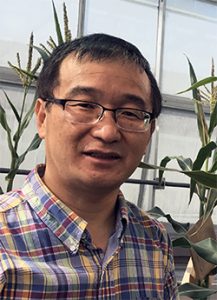
Ph.D.
Curators’ Distinguished Professor
Division of Plant Science & Technology
Curators’ Distinguished Professor
Member and Principal Investigator
Donald Danforth Plant Science Center
Research at a glance
Area(s) of Expertise
Research Summary
The main research foci of the Yang laboratory are 1) gaining a molecular understanding of host disease susceptibility and resistance to pathogenic microbes by using bacterial blight of rice as a disease model, and 2) developing and applying genome editing technologies for gene/trait discovery and for engineering improved traits such as disease resistance in crop plants.
Bing’s group has used rice as a workhorse to develop genome editing technologies and demonstrate their promising potential as biotech tools for basic and applied research in rice and other crop plants. With the increasingly available sequences of many plant genomes, technologies for genome editing have become the most promising and popular tools for scientists to understand such complex genomes and precisely and quickly manipulate them for good. Genome editing technologies allow precise, targeted genomic changes. TALENs and CRISPR/Cas represent the state-of-the-art genome editing technologies and hold immense promise for defining the genetic and molecular basis for valuable traits, as well as for the introgression of valuable genes/traits into cultivated varieties in a timely and economically sound manner.
Educational background
- Ph.D., Plant Pathology, Kansas State University
Courses taught
- PLNT_S 8330: Molecular Breeding and Genomic Technology